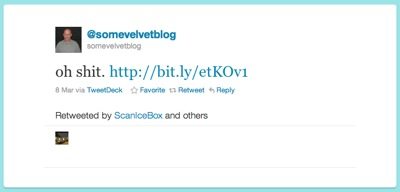The first I heard about the scandal at NPR was a tweet from my former colleague at WXPN, Bruce Warren:
That sounds about right.
In case you haven’t been following the news, a senior NPR official got pranked by a right wing blogger. The gist: a Muslim donor might be able to influence NPR’s news coverage. Despite the perception that NPR’s full of left-leaning liberals, everyone I’ve ever known there has worked very hard—sometimes to the point of overcompensation or over-reaction—to avoid being seen as biased toward one side or another. In an already contentious battle over government funding for public radio, this could be the final straw that forces popular opinion against NPR and its affiliates.
Still, what does this have to do with building an audience for your music career?
In Grow Your Band’s Audience, I advise musicians to avoid worrying about getting played on the radio, especially in the early days of their careers.
Think about your creative work, and what influences it. Have you created any really great stuff lately, using the “at-work station” as your background music? Even if you find yourself inspired by a loop of Katy Perry and Ke$ha, commercials distract. It’s their design.
So Lori and I find ourselves paying about $60 a month to two organizations we “hired” to force compelling new music on us. I’ve got SiriusXM on my iPhone, in my car, and at Lori’s craft table. And Lori set us up on a monthly, auto-renewing membership to WXPN.
In a fit of frugality, I spent about a full day trying to organize my iTunes library into something resembling a AAA station with about 500 of my favorite songs. (Most commercial radio stations have even fewer than this in rotation at any given time.) Despite the fact that I used to do this for a living, it proved impossible. I didn’t have enough raw material to make something really satisfying. I had no access to “currents” and “recurrents,” and to the “spice” that really good programmers throw at you when you lease expect it. Unless you’re a file hoarder, you probably don’t have that, either.
So I renewed my subscriptions to both satellite and public radio. I’m listening a lot to Jenny Eliscu’s shifts on the Spectrum, and it’s great to hear Larry Kirwan hosting Celtic Crush. I will admit that “Theme Time Radio Hour” sounds a lot more like the show Todd Rundgren and I were trying to make than what we could have pulled off when “The Difference” was on the air. I also downloaded RadioShift, a Mac application that enables me to use my home office iMac like a radio DVR. It records World Cafe episodes that I can’t get through the podcast (for licensing reasons). I’ve also got it set up to record Cerys Matthews and some of the other specialty show hosts on the BBC’s 6music — another public broadcasting service under the funding axe.
It used to be that specialty radio hosts practiced their craft under the radar, either on a low-power community radio station or in the wee hours of the morning. Plenty of my friends from radio accepted horrible pay in exchange for a few overnight hours where they could do whatever they want. While some specialty radio shows are really indulgent and self-serving, “artisinal radio,” when done well, can be an uplifting, exciting experience.
So, it’s a fair investment to hire Bruce and David and Cerys and Jenny and everybody else to do this for me. It frees me up to focus on my own great work, instead of micromanaging my playlist. SiriusXM is a commercial endeavor (disclosure: I’m a shareholder, too), and XPN’s a non-profit that does pretty darn well. If I could give the BBC money, I probably would, too. Radio budgets have become so tight that it’s important to show your direct support for this kind of programming—especially if you choose not to get hammered with commercials all day.

